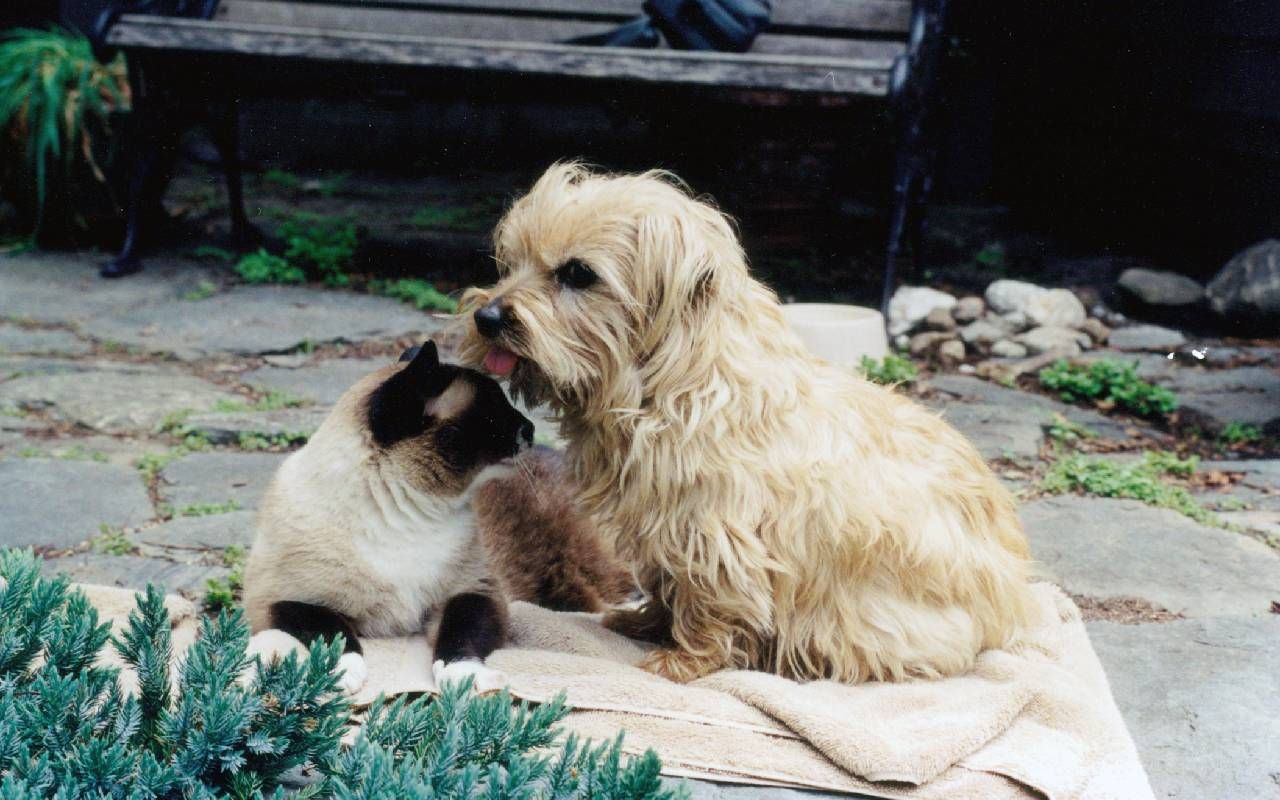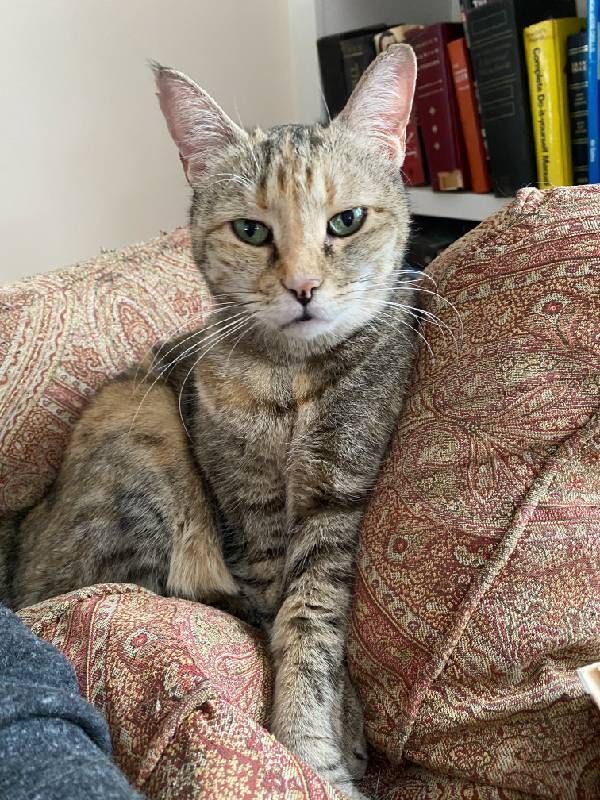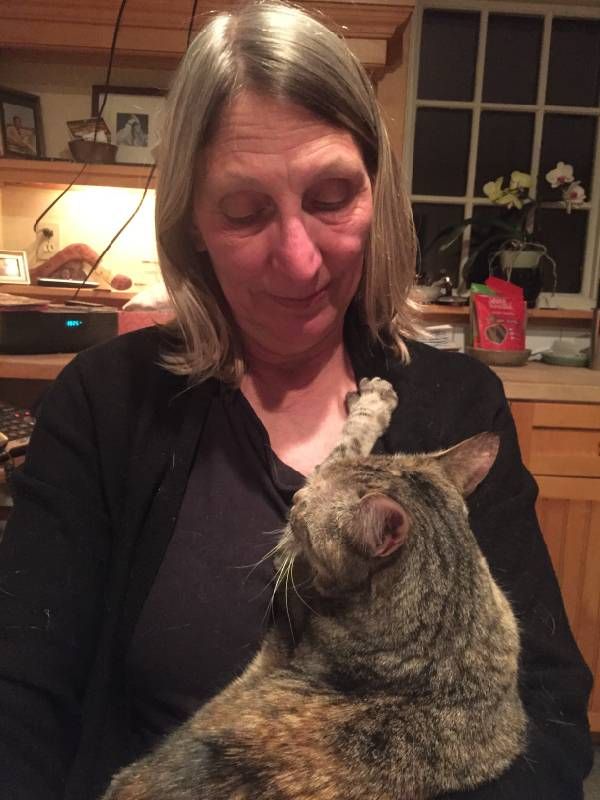The Joys and Grief of Adopting a Loved One's Pet
Adopting a friend’s cat kept her in my family’s lives. The death of that cat brought up layers of grief.
When I called my mother on the phone one early November afternoon, her voice was weary.
She'd picked up one of her cats, Isis, from the vet with bad news. The green-eyed tabby of unknown age had developed a tumor in her mouth that was inoperable. She had only a short time left before she would no longer be able to eat or drink.

My family home has always had at least a couple feline residents. But Isis was unique. She moved in six years ago after my mother's best friend and my godmother, Jenny, suffered a major stroke. For us, as for many people who take in pets from their loved ones, Isis was a living, eating, purring connection to our dear friend. As we processed losing this peculiar little cat, we also resurfaced feelings of grief and loss for Jenny.
"The thing that I could do immediately, besides coming down and giving her a hug, was to figure out how to care for the cats."
Jenny was part of our family. We celebrated holidays together, went on vacation together, stayed up late telling stories and laughing. A lifelong animal lover, she always kept a house full of doting cats and dogs. So when she was hospitalized after a severe stroke in May 2017, one of my mother's first concerns was Jenny's pets.
"The thing that I could do immediately, besides coming down and giving her a hug, was to figure out how to care for the cats," my mother, Mary, says.
In the haze of sadness and confusion as the impact of the stroke became clear, my mother and I lured Jenny's four cats into carriers. We rehomed three with friends. My mother kept Isis, who Jenny had named for the Egyptian goddess because her black-rimmed eyes and tufted ears gave her the profile of a pharaonic feline.
'A Strand of Jenny Into Our Lives'
Our Isis wasn't always an easy cat. She could be mean to other cats, and pushy to humans. Somehow, for people who are allergic to cats, her dander was especially toxic. But she brimmed with charming quirks. She'd participate in conversations. Her loud "meow" sounded like an impressed "wow!" Aggressively affectionate, she'd snag any opportunity to sit on a lap. When I pet her, she'd make unbreaking eye contact, purring as her lids drooped blissfully over light green irises.

Then there were the reminders of Jenny. My godmother died in 2020 after living in a nursing home following her stroke. Isis "brought a strand of Jenny into our lives," according to my mother. When Isis was going about her day being Isis — her loud demands for breakfast, her delight at sitting inside a paper bag — my mother could imagine her doing those same things in Jenny's home. More than just the act of love of taking care of her for Jenny was the connection to Jenny through her.
When Isis came home from the vet, barely eating with a bad prognosis, those strands that tied us to Jenny blazed bright.
"This little creature who was such a connection to Jenny, I didn't like the idea of that connection going away," my mother says.
Grieving for Pets
The death of any companion animal can be a difficult experience. After a human dies, there's often a gathering of community around that loss. But the loss of a pet is not always widely acknowledged, and may even be diminished, according to Michelle Crossley, vice president of the Association for Pet Loss and Bereavement and a faculty member in Rhode Island College's clinical mental health counseling program.

"It's really difficult to heal from loss when we're grieving in isolation," Crossley says. "A lot of people aren't willing to share their human animal bond or the loss or how they're feeling because they believe that they're going to be judged for it or people will minimize it."
The bonds that humans build with animals can be deeply comforting and meaningful. When people take in a pet from a loved one, the animal can become a source of support, according to Crossley. So when those animals die, it can be complicated, perhaps raising feelings of letting a loved one down or refreshing the grief of losing an important person.
"It makes other losses just feel a little bit closer and more present," Crossley says.
APLB offers resources to people going through loss of pets through chat rooms and video sessions, and trains vets and mental health professionals to support people grieving for animals. Crossley sees mindfulness as a tool for coping with bereavement. She explains it can be helpful to simply acknowledge, "this is bringing up feelings for the human that I lost that I wasn't prepared for."
Losing Lulu
When Hope Green's father died and her mother moved into a care facility, she adopted their dog Lulu. During the drive from Massachusetts to Vermont, the 10-year-old Norfolk terrier was shaking and afraid, Green recalls. Green stopped at a Burger King and got two hamburgers, one for her and one for the dog. That one-time treat won Lulu over.
"It was not hard to the degree of being the loss of my father all over again, but it was another piece of that loss."
Lulu became an important part of Green's daily life. Every time she spoke with her mother, she shared updates about the dog. Going through the grief and life changes that followed her father's death, looking after the dog wasn't complicated.
About two years later, Lulu was in total kidney failure. In the middle of a snowstorm, Green took her to the vet for the last time. When Lulu died, Green didn't only lose a wonderful dog. She also lost a way to help her mother, and a connection to her father. "It was not hard to the degree of being the loss of my father all over again, but it was another piece of that loss."
Grief is not linear, Green says. "You don't get over it, you get used to it."
She's found caring for animals of loved ones can be comforting and rewarding through the turbulence of losing a loved one — and the death of that pet can raise layers of grief.
"It takes the scab off," she says.
For my family, when my mother picked up Isis from the vet in early November, we expected the cat would have just a few days left. But true to her willful nature, she lived several more weeks.
Isis got to eat as often as she wanted, and drink from the kitchen tap. She feasted on morsels of Thanksgiving turkey. My mother made extra time for the cat to sit on her lap.
And during those final weeks, as we all shared photos and stories of Isis, Jenny's memory felt particularly close.


